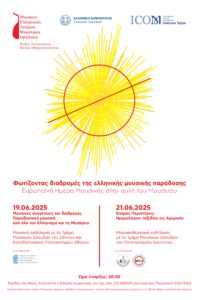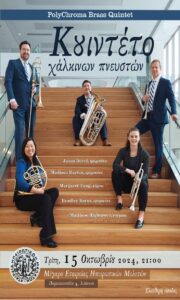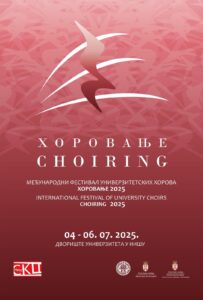Συναυλία χορωδίας Τμήματος Μουσικών Σπουδών στο Niš της Σερβίας
Στο Niš της Σερβίας θα βρίσκεται από 4 έως 7 Ιουλίου η Χορωδία του Τμήματος Μουσικών Σπουδών του Πανεπιστημίου Ιωαννίνων (Πανεπιστημιούπολη Άρτας) με αφορμή τη συμμετοχή της στο 3ο Διεθνές Φεστιβάλ Πανεπιστημιακών Χορωδιών “Choiring”. Διοργανωτές του φεστιβάλ είναι το Πολιτιστικό Κέντρο Σπουδαστών και η Ακαδημαϊκή Χορωδία του Πανεπιστημίου του Niš, ενώ, εκτός από την ελληνική χορωδία, πρόκειται να εμφανισθούν σύνολα πανεπιστημιακών ιδρυμάτων από Βουλγαρία, Τουρκία και Σερβία. Η Χορωδία του Πανεπιστημίου Ιωαννίνων, υπό τη διεύθυνση του Αντώνη Βερβέρη, θα παρουσιάσει έργα Purcell, Brahms, Miller, Παπακωνσταντίνου, Ξύνδα, Μπαλτά, Θεοδωράκη, Χατζιδάκι, Μικρούτσικου και Μαρκόπουλου. Συνοδεύουν οι: Νέλλη Σταχοσίδου (πιάνο), Νικόλας Χολέβας (κλαρινέτο), και Νίκος Ποταμούσης (κρουστά), ενώ τα σολιστικά μέρη αποδίδουν οι: Ευσταθία Δήμου, Παρασκευή Πάτρα, Μιχάλης Μοσχονησιώτης, Ανδριάνα Τζουβέκα, και Αργύρης Χαλαμούτης. Στα τέσσερα χρόνια λειτουργίας της χορωδίας, πρόκειται για το δεύτερο ταξίδι της στο εξωτερικό, ύστερα από την επίσκεψη στο Fasano της Ιταλίας, τον Δεκέμβριο του 2022.
Σπύρος Περιστέρης: Ημερολόγιον ταξιδίου εις Αμερικήν

Παίζουν: Οι φοιτητές και φοιτήτριες του Τμήματος Μουσικών Σπουδών του Πανεπιστημίου Ιωαννίνων: Ιωάννα Καρούση, Μαριάνθη Κοίλια, Γιώργος Παπαγεωργίου, Ηλίας Σήλλας (μαντολίνο), Αργυρώ Τομάζου (ακορντεόν), Χρήστος Κατσίδης (πιάνο). Μαντολίνο παίζει επίσης ο Παναγιώτης Κανελλόπουλος (Αν. Καθηγητής στο Τμήμα Μουσικών Σπουδών του Αριστοτελείου Πανεπιστημίου Θεσσαλονίκης).
Τραγουδούν τα μέλη της χορωδίας του Τμήματος Μουσικών Σπουδών του Πανεπιστημίου Ιωαννίνων: Κωνσταντίνος Καλοπήτας, Κωνσταντίνος Μαυρομάτης, Μιχάλης Μοσχονησιώτης, Περικλής Παπακάλας, Νικόλας Ποταμούσης, Αργύρης Χαλαμούτης, και η Μαρία Τσακανίκα, απόφοιτη του ίδιου Τμήματος
Μουσικολογική επιμέλεια – Διδασκαλία: Μαριάνθη Κοίλια
Σενάριο – Αφήγηση: Χάρης Σαρρής
Ενορχήστρωση: Σάββας Ρακιντζάκης
Διεύθυνση χορωδίας: Αντώνης Βερβέρης
Είσοδος ελεύθερη
Απαραίτητη η δήλωση συμμετοχής
Θα τηρηθεί σειρά προτεραιότητας
Τηλ. επικ.: 210 3254129
(Δευτέρα έως Παρασκευή 9:00-15:00)
Δείτε το δελτίο τύπου, καθώς και το πρόγραμμα των εκδηλώσεων.
Συναυλία του Κουιντέτου Χάλκινων Πνευστών “PolyChroma Brass Quintet”

Ρωμιοί και Θράκες Μουσουργοί της Έντεχνης Κοσμικής Μουσικής του 19ου και 20ού αιώνα: έργα για φωνή και πιάνο
Η Οικουμενική Ομοσπονδία Κωνσταντινουπολιτών, ο Σύλλογος Μουσικών Εκπαιδευτικών Αν. Μακεδονίας-Θράκης, το Ιστορικό Μουσείο Αλεξανδρούπολης και το Ζωγράφειο Λύκειο έχουν την τιμή να σας προσκαλέσουν στη συναυλία: «Ρωμιοί και Θράκες Μουσουργοί της Έντεχνης Κοσμικής Μουσικής του 19ου και 20ού αιώνα: έργα για φωνή και πιάνο» με τον Δρ Δημοσθένη Φιστουρή (φωνή) και τον Δρ Αθανάσιο Τρικούπη (πιάνο). Η εκδήλωση θα πραγματοποιηθεί το Σάββατο 27 Απριλίου, στις 19:30, στην αίθουσα τελετών του Ζωγραφείου Λυκείου στην Κωνσταντινούπολη.
Δείτε εδώ την πρόσκληση στην εκδήλωση.
Παρουσίαση κριτικής έκδοσης της όπερας «Μάρκος Μπότσαρης» του Νικολάου Μεταξά-Τζαννή
Στο πλαίσιο υλοποίησης του έργου HERMES-Heritage Rehabilitation as Multiplier cultural Empowerment within Social context, το Εργαστήριο Γνώσης & Ευφυούς Πληροφορικής του Τμήματος Πληροφορικής και Τηλεπικοινωνιών του Πανεπιστημίου Ιωαννίνων σας προσκαλεί στην παρουσίαση της κριτικής έκδοσης της όπερας του Νικολάου Μεταξά-Τζαννή (1824-1907) Μάρκος Μπότσαρης, που επιμελήθηκαν οι Αθανάσιος Τρικούπης (Αναπλ. Καθηγητής του Πανεπιστημίου Ιωαννίνων) και Νικόλαος Μαλιάρας (Καθηγητής του Πανεπιστημίου Αθηνών).
Την έκδοση θα παρουσιάσει η κα Ευανθία Νίκα Σαμψών, Ομότιμη Καθηγήτρια του Αριστοτελείου Πανεπιστημίου Θεσσαλονίκης και πρόεδρος της Ελληνικής Μουσικολογικής Εταιρείας.
Την εκδήλωση θα προλογίσει η Διευθύντρια της Μουσικής Βιβλιοθήκης, κα Στεφανία Μεράκου. Η εκδήλωση θα πραγματοποιηθεί στην Αίθουσα Γιάννης Μαρίνος (πρώην Πολυχώρος) της Βιβλιοθήκης στο Μέγαρο Μουσικής Αθηνών, την Τετάρτη 20 Μαρτίου και ώρα 7.00μ.μ.
Δείτε την πρόσκληση της εκδήλωσης εδώ
A Xenakis Dictionary
Το Λεξικό Ξενάκη στοχεύει στον ορισμό εννοιών της πρακτικής και της σκέψης του Ιάννη Ξενάκη. Αν και η έμφαση δίνεται στους όρους του ίδιου του Ξενάκη, το λεξικό περιλαμβάνει επίσης όρους και έννοιες που εισάγονται από ειδικούς και θεωρούνται πολύτιμοι για την κατανόηση της φιλοσοφίας και της συνθετικής πρακτικής του Ξενάκη. Ο στόχος είναι διττός: πρώτον, να δοθούν σαφείς ορισμοί για τους αναγνώστες που δεν είναι εξοικειωμένοι με το έργο του Ξενάκη και, δεύτερον, να δοθεί χώρος στους συγγραφείς να συμπεριλάβουν τη δική τους ερμηνεία των εννοιών αυτών, απευθυνόμενοι έτσι στον πιο ενδιαφερόμενο αναγνώστη. Συνολικά, το λεξικό απευθύνεται στην ακαδημαϊκή ερευνητική κοινότητα, τους συνθέτες, τους μουσικούς, τους αρχιτέκτονες και τους λάτρεις του Ξενάκη. Κάθε λήμμα στοχεύει στην επίτευξη ισορροπίας μεταξύ αυστηρής παρουσίασης και προσιτού περιεχομένου.
https://www.iannis-xenakis.org/en/dictionary/
Βιβλιογραφική αναφορά:
EXARCHOS, Dimitris. 2023. A Xenakis Dictionary. https://www.iannis-xenakis.org/en/dictionary
Ρεσιτάλ πιάνου Παύλου Αντωνιάδη στο πλαίσιο του 14ου Διεθνούς Φεστιβάλ Σύγχρονης Μουσικής Φάρος
Ο Παύλος Αντωνιάδης είναι πιανίστας, μουσικολόγος και δημιουργικός τεχνολόγος, επί του παρόντος αναπληρωτής καθηγητής Μουσικής Επικοινωνίας και Τεχνολογίας στο Πανεπιστήμιο Ιωαννίνων, και από το 2014 συνεργάτης της ομάδας διάδραση-ήχος-μουσική-κίνηση στο IRCAM στο Παρίσι. Ως σολίστ, έχει συνεργαστεί με συνθέτες όπως οι Mark Andre, Helmut Lachenmann, Brian Ferneyhough, Wolfgang Rihm, Tristan Murail, και έχει παρουσιάσει σε πρώτη εκτέλεση έργα για σόλο πιάνο των James Erber, Νικόλα Τζώρτζη, Andrew R. Noble, Luis Antunes Pena, μεταξύ άλλων. Ο προγραμματισμός του περιλαμβάνει τα πιο σύνθετα σύγχρονα έργα, ακραίες μορφές σωματικότητας, ζωντανά ηλεκτρονικά, πολυμέσα, αισθητήρες, εικονική πραγματικότητα και μουσικό θέατρο, συχνά σε εκλεκτικό διάλογο με αρχαίο ρεπερτόριο. Έχει ηχογραφήσει για τις εταιρείες Mode (2015 Γερμανικό Βραβείο Κριτικών / Deutscheschallplattenkritikspreis), Wergo και Diatribe. Ο Παύλος Αντωνιάδης κάνει το ντεμπούτο του στην Κύπρο με ένα μοναδικό ρεσιτάλ, μέσα στο πλαίσιο του 14ου Διεθνούς Φεστιβάλ Σύγχρονης Μουσικής Φάρος, όπου θα ερμηνεύσει ένα σπάνιο και καθόλα εντυπωσιακό πρόγραμμα με έργα των François-Bernard Mâche, Ιάννη Ξενάκη, Μαρίας Καουτζάνη, Hakki Cengiz Eren, Leoš Janáček, και Galina Ustvolskaya.
?????????:
François-Bernard Mâche
Croquis (2020)
Ιάννης Ξενάκης
Ευρυάλη (1976)
Μαρία Καουτζάνη
Νέο Έργο – Ανάθεση
Hakki Cengiz Eren
Two Meditative Pieces for Piano (2012)
Leoš Janáček
V mlhách (1912)
Galina Ustvolskaya
Σονάτα 6 (1988)
Οργανωτής: Pharos Arts Foundation
Τοποθεσία: The Shoe Factory, Λευκωσία, Κύπρος
Ημερομηνία και ώρα έναρξης: 13 Οκτωβρίου, 20:30
Συναυλία Παύλου Αντωνιάδη: Podium Gegenwart – Contemporary Insights meets SOMAX2 AI Agent
[DE Unten]
On 28.09 at 2pm in Berlin we open the season with our first concert as part of the “Symposium und Konzerte “Diversität und neue Musik” organised by the Deutscher Musikrat (Podium Gegenwart). And we couldn’t be more excited to present our new project -Contemporary Insights Meets Somax2 Ai Agent. Existing solo recordings by each of the five performing CI musicians, drawn from the repertoire on which the ensemble focuses (works by Andrew Greenwald, Iannis Xenakis, Evan Johnson, Michael Finnissy, among others), will be added to the Somax2 agent. Learning from this musical corpus, Somax2 will draw its performative material and become another member of the ensemble. The performance becomes a “comprovisation”, a composition through improvisation – a process of live creation of a piece through superimposition and a multi-layered back-and-forth dialogue between all the actors involved, humans and AI. Concept and coordination IRCAM – Ensemble Contemporary Insights: Pavlos Antoniadis. Supported by ERC-funded programme REACH – Raising Co-creativity in Cyber-Human Musicianship (Principal Investigator: Gérard Assayag), IRCAM Representations Team (Head: Gérard Assayag) and IRCAM Team Interaction-Son-Musique-Mouvement (Head: Frédéric Bevilacqua) Come and meet Somax2 Ai Agent with us in Berlin, we look forward to seeing you!
Event: https://www.facebook.com/events/1504787530286601
[DE]
Am 28.09. um 14:00 Uhr eröffnen wir die Saison mit unserem ersten Konzert im Rahmen des vom Deutschen Musikrat organisierten “Symposiums und Konzerte“ Diversität und neue Musik. Wir freuen uns sehr, unser neues Projekt – Contemporary Insights Meets Somax2 Ai Agent vorstellen zu können. Bereits vorhandene Soloaufnahmen von jedem der fünf auftretenden CI Musiker*innen, die aus dem Kernrepertoire des Ensembles stammen (Werke u.a. von Andrew Greenwald, Iannis Xenakis, Evan Johnson, Michael Finnissy) werden in den Somax2-Agenten eingespeist. Aus diesem musikalischen Gerüst lernend, wird Somax2 sein performatives Material schöpfen und ein weiteres Mitglied des Ensembles werden. Die Aufführung wird zu einer “Komprovisation”, einer Komposition durch Improvisation – ein Prozess der Live-Schaffung eines Werks durch Überlagerung und einen vielschichtigen Hin- und Her-Dialog zwischen allen beteiligten Akteuren, Menschen und KI. Konzept und Koordination IRCAM – Ensemble Contemporary Insights: Pavlos Antoniadis. Unterstützt vom ERC-finanzierten Programm REACH – Raising Cocreativity in Cyber-Human Musicianship (Principal Investigator: Gérard Assayag), IRCAM Representations Team (Leiter: Gérard Assayag) und IRCAM Team Interaction-Son-Musique-Mouvement (Leiter: Frédéric Bevilacqua) Kommen Sie und lernen Sie Somax2 Ai Agent mit uns in Berlin kennen, wir freuen uns auf Sie!
Veranstaltung: https://www.facebook.com/events/1504787530286601
Οργανωτής: Deutscher Musikrat
Τοποθεσία: Villa Elisabeth, Berlin, Deutschland
Ημερομηνία και ώρα έναρξης: 28 Σεπτεμβρίου, 14:00
Εισήγηση Παύλου Αντωνιάδη στο 6ο Πανελλήνιο Συνέδριο Γνωσιακής Επιστήμης – Beyond symbolic representation in music: 4E cognition applications in human learning and Artificial Intelligence
Beyond symbolic representation in music: 4E cognition applications in human learning and Artificial Intelligence The talk will problematize symbolic representation in music from the point of view of 4E cognition and will propose alternative paradigms, through applications in human learning and Artificial Intelligence. Symbolic representation in the form of music notation has been central for the historic development of Western Music. Nevertheless, latest developments in music, musicology, music technology, cognitive science and Artificial Intelligence have questioned the primacy of notation for
music representation and communication. For example, contemporary music aesthetics are indicative of a universal shift from music-as-notes to sound; musicology has been registering performative and ethnographic turns, as well as an embodied cognitive4 turn, following up from ecological and non-computational paradigms in cognitive science, often summarized under the rubric of 4E (embodied, embedded, extended and enacted) cognition; music technology provides means for the multimodal representation of musical practices and Artificial Intelligence is increasingly focusing on multimodal training as the foundation of knowledge representation. After an overview of these developments, I will present a hypothesis for embodied interaction with
music notation inspired by radical embodied cognition; an application on human learning, in the form of a sensor-based interactive system for learning complex notated music through gesture classification and following, using machine learning techniques; and a critique of symbolic representation in state-of-the-art Artificial Intelligence systems for music improvisation, proposing 4E alternatives. Some of my related research questions will be: How do we represent musical performance? Is musical performance representable in the first place, and what are the epistemological biases related to symbolic representation? Are paradigms other than the symbolic / score-oriented paradigm possible, and what could be their role in human learning and Artificial Intelligence music applications?
Οργανωτής: Ελληνική Εταιρεία Γνωσιακής Επιστήμης
Τοποθεσία: Ξυλόκαστρο
Ημερομηνία και ώρα έναρξης: 21-24 Σεπτεμβρίου 2023
Σάββατο 23 Σεπτεμβρίου, 11:00 – 12:15
Εισήγηση Παύλου Αντωνιάδη στο 2nd Conference of the International Academy of the History of Science: Science and Human Values: A brief history of music performance epistemologies as a model towards sustainable AI creative applications
How can knowledge on music performance inform knowledge representations in creative AI? This is the core question of the proposed talk, which emphatically supports the hypothesis of reciprocal Human-AI creative synergies in lieu of hegemonic, media-hyped and technodeterministic discourses around human replacement in the arts.
The epistemologies of music performance are essentially plural, indicating both the cultural diversity of the phenomenon and an interdisciplinary web of knowledge, comprising the humanities, the sciences, as well as several forms of artistic research (practice-based research and research-based practice).
The paper will first briefly trace the trajectory of music performance epistemology, from historic and systematic musicology to computational musicology and interactive music performance, through ‘performative’and ‘embodied cognitive’ turns, computation of multimodal performance data, interactive systems development, performance augmentation and Human-AI comprovisation. It will then anchor these developments in a broader context of contemporary epistemology that acknowledges the social and historical dimensions of an ethnographic approach to knowledge acquisition. It will subsequently integrate them in the context of a philosophy of computation, that applies both analytic and continental philosophy tools towards the understanding of epistemic accesses and biases in current AI. Finally, it will show how this knowledge contributes to three concrete case studies of Human-AI synergies around piano performance, all developed based on a 4E (embodied, embedded, enactive and extended) approach to performance knowledge: a score-based paradigm, an improvisation paradigm and a multimodal augmentation paradigm.
Οργανωτής: Academy of the History of Science / Εθνικό Ϊδρυμα Ερευνών
Τοποθεσία: Εθνικό Ϊδρυμα Ερευνών
Ημερομηνία και ώρα έναρξης: 13 Σεπτεμβρίου, 16:00-18:00
Συναυλία και διάλεξη Παύλου Αντωνιάδη: Improtech@Uzeste 2023, 46th Hestajada de les arts Festival
Somax2, hommage à Xenakis
Marco Fiorini (Ircam), Mikhail Malt (Ircam), Lorenzo Colombo (percussioniste), Pavlos Antoniadis (Université de Ioannina)
Somax2 est un logiciel pour la co-improvisation musicien – machine basé sur une écoute automatique, un moteur réactif et un modèle génératif qui fournissent une improvisation stylistiquement cohérente tout en s’adaptant continuellement au musicien (ou à d’autres agents Somax2). Somax2 utilise un modèle de mémoire cognitive et des algorithmes d’IA pour apprendre des matériaux musicaux et trouver les correspondances avec les éléments mélodiques, texturaux et rythmiques du mmusicien. A partir de leur pièce “A.I. Komboï “ (Hommage à Iannis Xenakis) Marco Fiorini et Lorenzo Colombo montreront comment l’IA peut aider à créer un morceau de musique cohérent après avoir été instruite pour utiliser le matériel de clavecin composé par Xenakis, réagir au matériel de percussion par une écoute active, créer une musique improvisée cohérente en temps réel. Mikhail Malt parlera de même de ses hommage à Keren pour trombone (avec Benny Sluchin) ou Evryali pour piano (avec Pavlos Antoniadis) de Xenakis.
Οργανωτής: IRCAM/Hestajada de les arts Festival
Τοποθεσία: Uzeste, France
Ημερομηνία και ώρα έναρξης: 11 Αυγούστου 2023, 21:30
Συναυλία του μουσικού σχήματος «Εν Χορδαίς» για τα 100 χρόνια από την υπογραφή της Συνθήκης της Λωζάνης
Με αφορμή την επέτειο των 100 ετών από την υπογραφή της Συνθήκης της Λωζάνης, το Γενικό Προξενείο της Ελλάδας στη Γενεύη διοργανώνει, με τη στήριξη της Γενικής Γραμματείας Απόδημου Ελληνισμού και Δημόσιας Διπλωματίας και του Δήμου Λωζάννης, καθώς και τη συνεργασία των Συλλόγων Ελληνο-ελβετικής Φιλίας και Μέλισσας του Ελληνισμού, του μουσικού σχήματος «Εν Χορδαίς» με προσκεκλημένους μουσικούς.
Η συναυλία θα πραγματοποιηθεί το Σάββατο 14 Οκτωβρίου στις 20:00, στη Salle Paderewski (Allée Ernest-Ansermet 3, CH 1003 Lausanne) σημαίνοντας και τη λήξη του επετειακού προγράμματος στην ομώνυμη συνθήκη που διοργάνωσε ο Δήμος Λωζάνης για το έτος 2023.)
Συμμετέχουν τα μέλη ΔΕΠ του Τμήματος Μουσικών Σπουδών του Πανεπιστημίου Ιωαννίνων:
Κυριάκος Καλαϊτζίδης, Αναπληρωτής Καθηγητής
Νίκος Ανδρίκος, Επίκουρος Καθηγητής
Δείτε εδώ το σχετικό link.
Συναυλία με έργα ελλήνων συνθετών από τα Μουσικά σύνολα του Τμήματος
Αίθουσα Διώνη, Εκθεσιακό Κέντρο Άρτας, Τετάρτη 14.06.2023, ώρα 19:00
Έργα των: Αλέξανδρου Γεωργιάδη, Παναγιώτη Θεοδοσίου, Άρη Καραστάθη, Γιώργου Κοντογιώργου, Φανής Κοσώνα, Σπύρου Μάζη, Χαράλαμπου Ναβροζίδη, Μιχαήλ Τραυλού, Ευδοξίας Υψηλάντη και Γιώργου Χλίτσιου.
Ερμηνεύουν:
Κλαρινέτο: Απόστολος Δημητρίου
Σοπράνο: Κυριακή Παπαντωνίου
Τρομπέτα: Στυλιανός Καραβίδας
Φλάουτο: Στυλιανή Γιωτοπούλου, Ευτυχία Κατσίκου, Μαρία Μεσσάρη και Ελένη Σφήνα
Πιάνο: Παρασκευάς Γέρου, Δημήτρης Γρουζής, Αριστοτέλης Δώδας, Μαρία Ζαρκάδα, Στυλιανός Καραβίδας και Ανδριάνα Τζουβέκα
Επιμέλεια: Ιβόνα Γκλίνκα
Διοργάνωση:
Αρταίων Δημοτική Ανώνυμη Εταιρία Ο.Τ.Α. – ΤΜΣ Πανεπιστήμιο Ιωαννίνων
Δείτε εδώ την αφίσα της εκδήλωσης
BUILDING RELATIONSHIPS IN A CHANGING WORLD – EUROPEAN MUSICOLOGICAL SEMINAR -“The (post)pandemic political economy of music and its impact on Higher Education: musicology teaching and research amidst technological acceleration and media hypes”
IReMus (institut de recherche en musicologie), Sorbonne Université
Υπεύθυνες:
Louisa MARTIN-CHEVALIER, Sylvie DOUCHE, Anne PIÉJUS, Théodora PSYCHOYOU
Δευτέρα 12 Ιουνίου, 16-18 ώρα Ελλάδας
Σύνδεσμος συνάντησης: https://us02web.zoom.us/j/84947391047?pwd=WFVhZDZnSjE3YUFnbGc3OElYVTVidz09
Σε συνέχεια της 6ης διάλεξης του Παύλου Αντωνιάδη στα πλαίσια του μαθήματος “Πολιτιστική Διαχείριση” (Διδάσκουσα: Μαρία Ζουμπούλη) υπό τον τίτλο “Πολιτιστική επικοινωνία και διαχείριση στον (μετά)πανδημικό κόσμο: Υγρές αγορές της μουσικής”, που έλαβε χώρα στις 11 Μαΐου, φοιτήτριες και φοιτητές του ΤΜΣ του Πανεπιστημίου Ιωαννίνων (Μιχαήλ Στέφανος Καραγιάννης, Έλλη Ελισσάβετ Συρουχίδου, Δημήτριος Παπαδημητρίου, Μιχαήλ Βελεγράκης, Άγγελος Αντώνογλου, Κλεοπάτρα Βάγια) συμμετέχουν στην εισήγηση του Παύλου Αντωνιάδη στο διαδικτυακό σεμινάριο BUILDING RELATIONSHIPS IN A CHANGING WORLD – EUROPEAN MUSICOLOGICAL SEMINAR, που οργανώνεται από το εργαστήριο IReMus στο Πανεπιστήμιο της Σορβόννης: https://www.iremus.cnrs.fr/fr/evenements/building-relationships-changing-world-european-musicological-seminar?fbclid=IwAR1G4eYU79iPSeo–vb3z-SC2spJbvRmifVpEhG-IOK0dQGmgcjbVenSHec .
Η συζήτηση θα εστιάσει στο πώς πρέπει να προσαρμοστεί η ανώτατη μουσική και μουσικολογική εκπαίδευση στα φαινόμενα της μεταπανδημικής πολιτικής οικονομίας της μουσικής, με κυριότερο αυτό της τεχνολογικής επιτάχυνσης, όπως παρουσιάστηκαν στο αντίστοιχο μάθημα. Η συμμετοχή των φοιτητριών και φοιτητών θα είναι κεντρικής σημασίας, σαν εκπρόσωποι μία νέας γενιάς που βιώνει αυτές τις προκλήσεις σε μία χώρα που έχει πληγεί από την κρίση πολλαπλά, όπως η Ελλάδα. Παρακάτω η σύνοψη της παρέμβασής του κ. Αντωνιάδη στα Αγγλικά.
Objective of this seminar is to discuss recent musicology teaching and research experiences, in the light of technological acceleration and the ensuing media hypes, and to make policy proposals for current and future curricula in music studies and the digital humanities. Undergraduate student reactions after a recent lecture of mine on the (post)pandemic political economy of music at the University of Ioannina were indicative of a wide range of responses, from techno-utopianism to techno-dismissiveness, among a generation of “digital natives” growing up after the 2008 global economic collapse, in a crisis-plagued country like Greece, basically never having experienced a crisis-free interval given the subsequent challenges (the COVID-19 pandemic, the war in Ukraine and climate crisis, to name just a few).
My presentation will include some elements on the (post)pandemic political economy of music, such as: streaming and data surveillance, sensor-based interaction, the Metaverse and Internet of Things, Artificial Intelligence, blockchain and NFTs. Those elements will be entangled in a broader discussion on the 4th industrial revolution, cognitive capitalism, neoliberalism and biopolitics, inviting students from the University of Ioannina to participate and share their experiences with the IReMus community and the wider community of the European Musicological Seminar. Subsequently, a discussion will be launched on the required policy adjustments that would enable us to cope with students’ need for intellectual and emotional reassurances in a rapidly changing world, enveloped in multiple crises. Of particular interest will be the interdisciplinary set of skills and theory in the nexus of humanities, sciences and the arts that modern music studies represent, as well as the focus on sociopolitical issues such as: the perspective of creatives being replaced by AI, the spectre of general unemployment projections, and issues of sustainability of music technologies and frugal innovation in the face of impending ecological and economic collapse.


